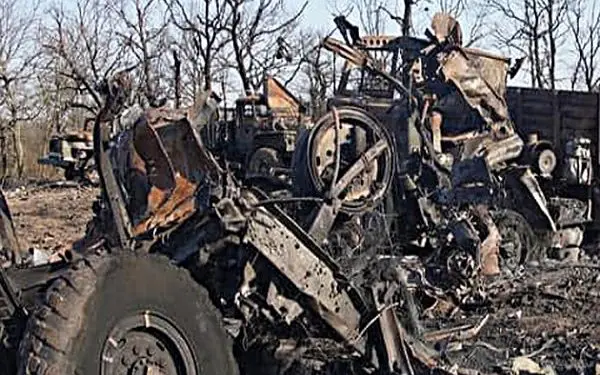Peace talks in Istanbul between Ukraine and Russia yielded progress on Tuesday as Moscow promised to scale back its military activity near the capital Kyiv and the northern city of Chernihiv, although the statements were met with caution in some quarters. Russian and Ukrainian delegations met for face-to-face negotiations more than a month after Russia launched an air and ground invasion that has devastated towns and cities across the country and caused nearly 4 million people to flee. The representatives met at the Dolmabahce Presidential Office, on the banks of the Bosphorus with both sides setting low expectations. However, after more than four hours the head of the Russian delegation, Vladimir Medinsky, told reporters the discussions had been “constructive” and that Kyiv’s peace proposals would be looked into. Russian President Vladimir Putin’s envoy also said Moscow was ready to take military and political “steps to de-escalate the conflict, informs news agency MIA.
” Shortly before Medinsky spoke, Russian Deputy Defense Minister Alexander Fomin announced a significant reduction in “military activities” near Kyiv and Chernihiv. Russian troops have struggled to advance upon the center of two northern cities due to fierce Ukrainian resistance. Moscow emphasized the concession did not amount to a ceasefire for Kyiv and Chernihiv.
Still, if Russia follows through and the attacks are reduced, it would mark an important step on the path toward ending the war Russia launched on Feb. 24. A broader cessation of hostilities was still out of reach, both sides said. Securing international security guarantees for Ukraine remains a key issue before Kyiv can agree to a nationwide ceasefire, said Mykhailo Podolyak, a senior advisor to Ukrainian President Volodymyr Zelensky.
He said NATO members Britain, Turkey, France, Germany and the United States could serve as guarantor states in case of a possible deal with Russia.
Medinsky said Kyiv had proposed that Moscow accept the possibility of Ukraine joining the European Union. In exchange, Ukraine could renounce its ambitions to join NATO. However, Ukraine’s offers did not bend in Russia’s favor on Crimea, or Luhansk and Donetsk, which Russia demands be recognized as independent states, Medinsky said.
Turkish President Recep Tayyip Erdogan had addressed the participants at the outset, appealing for a ceasefire. Later on, those appeals were echoed by the leaders of the US, Germany, France, Britain and Italy, who pledged their continuing support for Ukraine and strongly condemned Russia’s war after a joint telephone call.
They also called on Putin to allow humanitarian aid to be brought to Ukraine and to permit effective humanitarian escape routes to be established, particularly in Mariupol, which has been under siege for weeks. Helping the people of the embattled port city of Mariupol was also the subject of talks between Putin and French President Emmanuel Macron, according to statements issued by both governments.
Putin told Macron that the Russian army was delivering humanitarian aid and evacuating civilians, a Kremlin statement said. Macron told Putin a ceasefire was necessary in order to bring in supplies and evacuate civilians amid the catastrophic humanitarian situation in the city, according to the Élysée Palace, which said Putin said he would think about that and get back to Macron.
Meanwhile, Ukrainian authorities say Russian troops are abducting and targeting civilians in Mariupol, a charge Moscow has denied, claiming that Ukrainian nationalists are using civilians as human shields. As talks continued, so did Russia’s hostilities against Ukraine.
In the southern Ukrainian city of Mykolaiv, the regional administration building was attacked by the Russian army, presumably with a missile. According to the local civil defense, three people were killed and at least 22 others injured in Tuesday’s attack. It is impossible to independently verify information from either side. Russia claims it is only targeting military sites, even though there are daily confirmed reports of the destruction of bridges, schools, hospitals and residential neighbourhoods.
Meanwhile, US President Joe Biden responded cautiously to Russia’s announcement that combat operations would be significantly scaled back, saying he would not evaluate the statements until he could “see what their actions are.”
“Let’s just see what they have to offer,” Biden said at the White House. Until there is actual change, pressure on Moscow would continue with “strong sanctions” and support for the Ukrainian military, Biden said.
The US Defense Department was also skeptical about the announcement, calling it a tactical maneuver.
An official warned of the possibility that fresh attacks could take place in other parts of the country. A small number of Russian troops were moving north of Kyiv away from the capital, in what the Pentagon sees as a “repositioning, not a real withdrawal,” said spokesman John Kirby.
“We all should be prepared to watch for a major offensive against other areas of Ukraine.” Zelensky said defending Ukraine continues to be Kyiv’s top priority despite Russian indications that the siege of the Ukrainian capital was being eased.
“These signals do not drown out the explosions of Russian shells,” Zelensky said in his daily video address published on Telegram. “The enemy is still on our territory.”
















